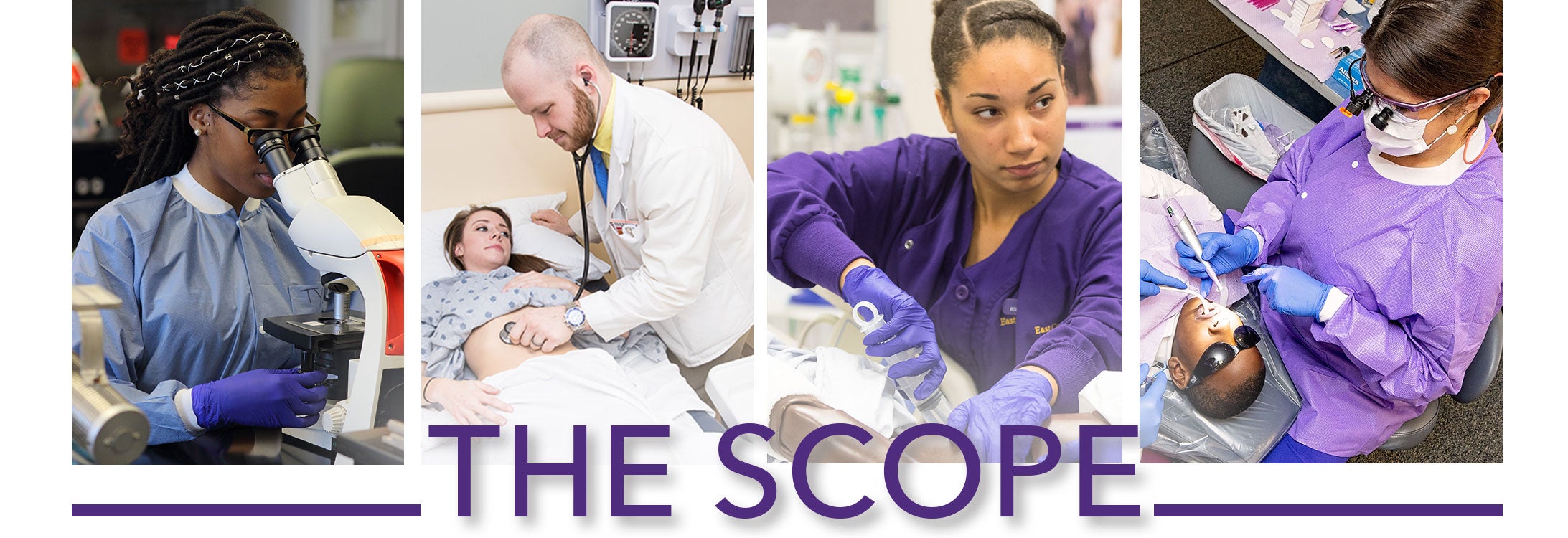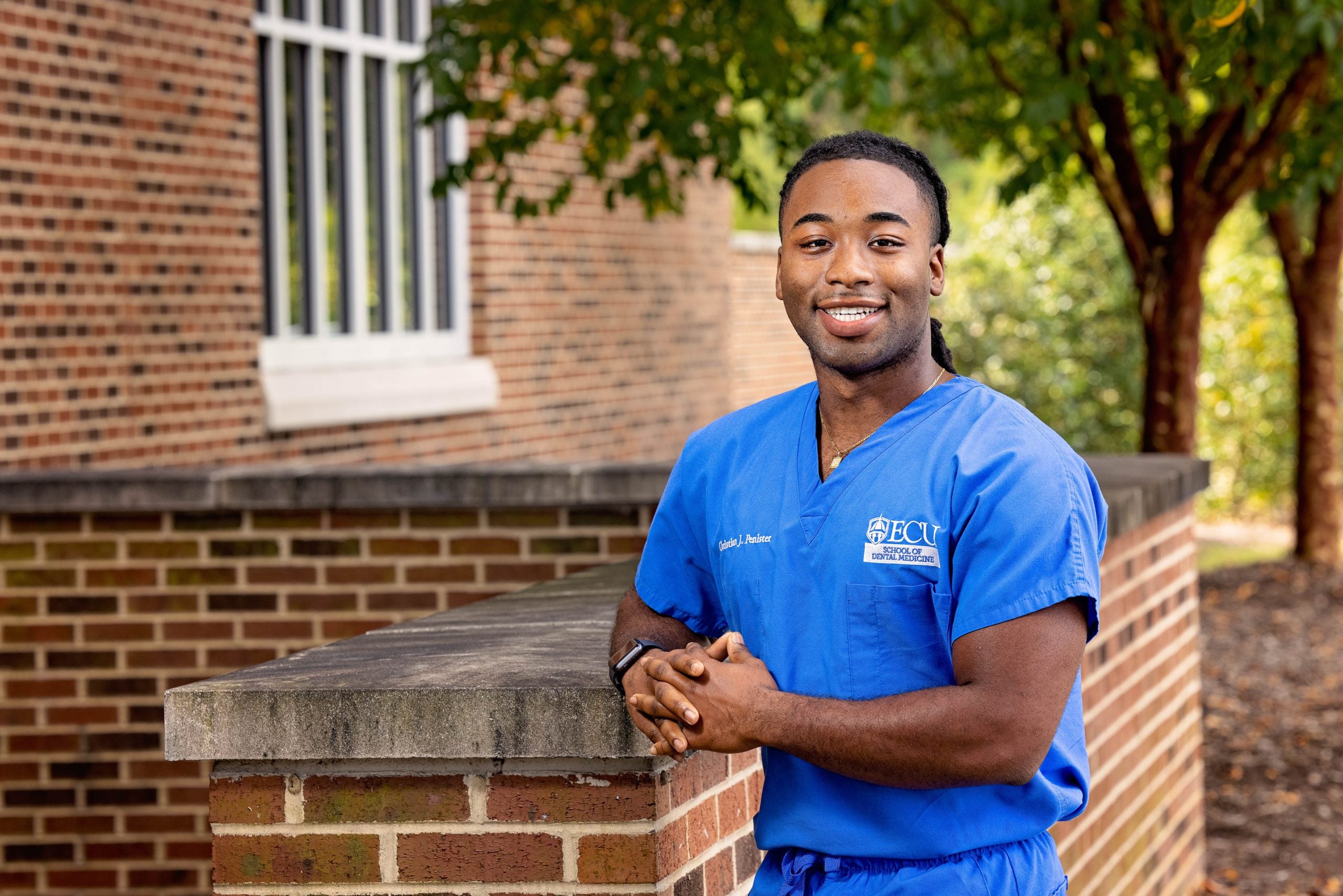August 2021
Welcome to “The Scope,” the newsletter of the ECU Division of Health Sciences.
Welcome to the August 2021 issue of The Scope, the newsletter of the ECU Division of Health Sciences.
Colleagues,
It has been a great few weeks meeting newcomers and welcoming back others. I really like the hospitality that I’ve been experiencing. What I have witnessed is that not only can we be all about our mission, but we can do that and be inviting at the same time. I think this particular trait is very important, also from a Division of Health Sciences standpoint, and especially right now.
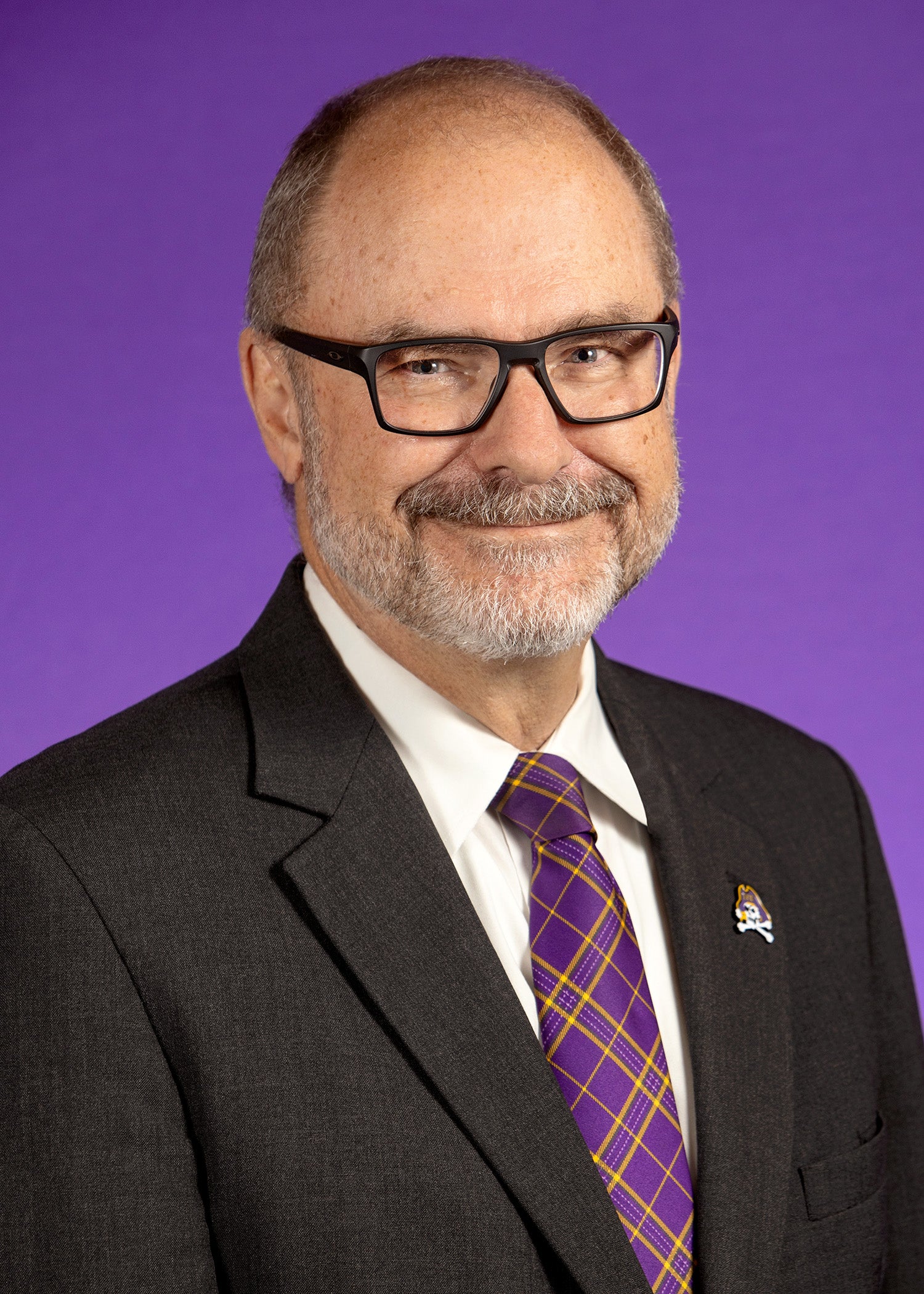
Dr. Ron Mitchelson
As part of our division’s mission, we will focus on the success of more than 5,000 health sciences students this fall. That is close to record enrollment for the division, if it is not the record. It’s a tribute to the importance of the division’s educational programs, the excellence with which they are delivered, and our inviting culture. Thank you for your individual contributions to those key characteristics of the division.
I emphasize the student success portion of our mission today because we are face to face in our classrooms, our labs and our clinics. We are coming together at the very time that the COVID-19 Delta variant has presented itself with rapid acceleration. The coming weeks will be tricky, and it will take significant resolve to stay the course. Make no mistake. We will witness cases and clusters, and we will be compelled to adjust operations at the time and location of their detection. However, our adjustments will be directed with far greater precision than we were able to accomplish last year.
There will be no campus-wide pivot to remote teaching and learning. This means that an individual class section might have to be paused for a two-week period if a cluster is associated with that section. I want this type of potential outcome to be on your radar. The decision to pause a class section will be a joint decision involving faculty, chair, dean and public health officials (Student Health and Prospective Health).
I have learned a great deal since beginning this interim role. I have learned that you are up to the task. The success of our students is never easy under the best of circumstances. Your passion and compassion will play key roles as we cope with the challenge of the next few weeks. It is comforting to know that I have great colleagues like you to face it together.
Pirates, hold fast and stay the course.
Dr. Ron Mitchelson
Interim Vice Chancellor
ECU Division of Health Sciences
Education
Traditions within the division’s colleges and schools continued, from marking special events to honoring premier scholarship recipients.
During the College of Allied Health Sciences’ Fall Convocation, Dean Robert Orlikoff emphasized the importance of the college’s upcoming semester and explained ways the college will accommodate new needs brought about by the pandemic.
“It’s important for us to recognize just how important our mission and our educational activities are. We cannot halt or decrease the quality of the preparation of the next generation of health care professionals, because everything depends on it,” Orlikoff said. “We can see that when we see how things have been stopped or disrupted across the world, and we have a major role to play. And, I can’t imagine a better learning opportunity, a more transformative opportunity than we have right now, with the stakes that really couldn’t be higher.”
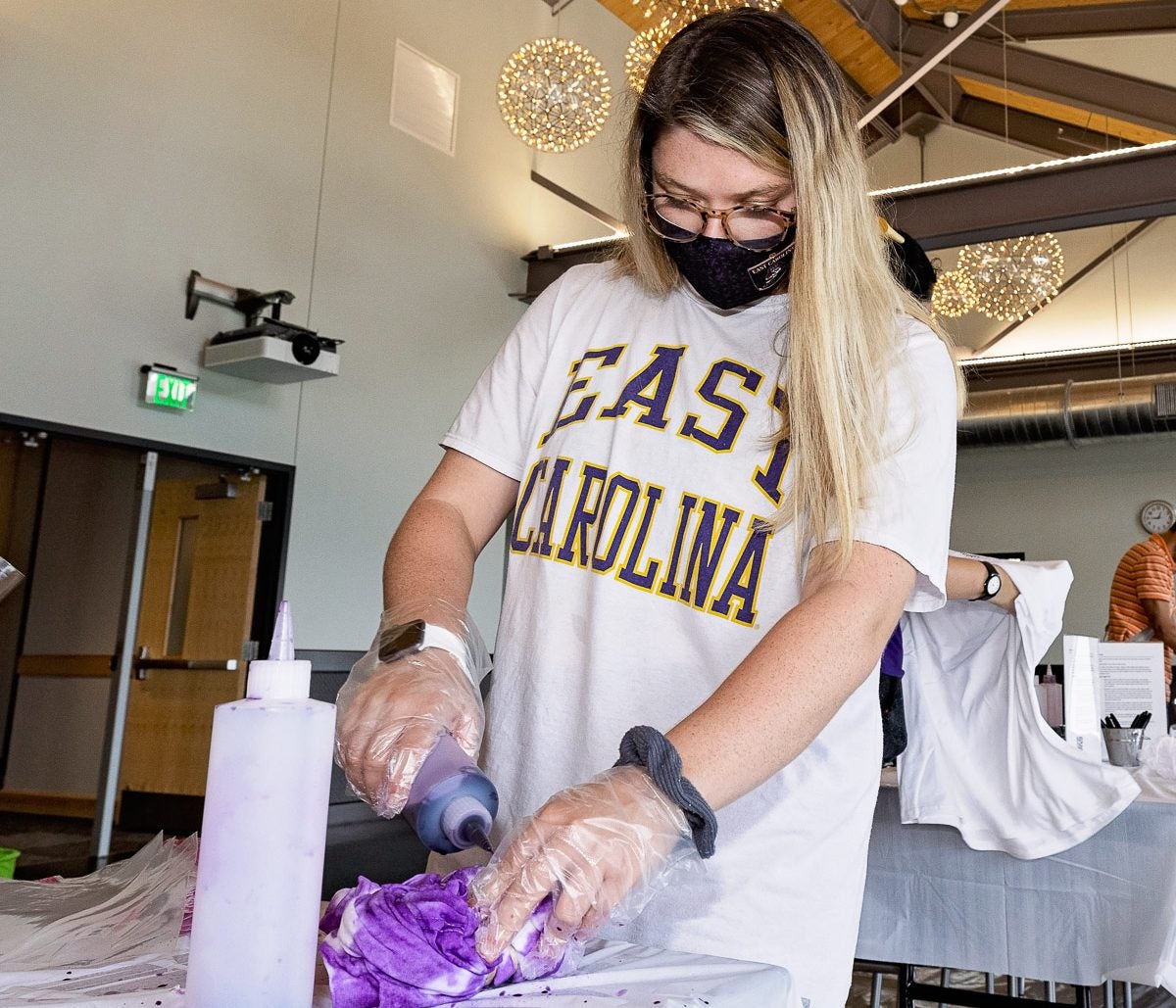
Caela Collichio makes a tie-dye shirt at the CAHS Welcome Social in the Health Sciences Student Center. (ECU Photo by Cliff Hollis)
Orlikoff also urged faculty and staff to think about their work in terms of transformation.
“We can’t transform eastern North Carolina socially or economically, if we don’t transform the health, wellness and safety of our local communities,” Orlikoff said. “So, we have to meaningfully address access to health care, the efficiency and effectiveness of health care… If we can do that, we can make good on ECU’s ultimate mission in transforming the lives of individuals, families and communities.”
Later in the day, the college held a welcome social where students, faculty and staff were invited to play games and make their own tie-dye T-shirts.
The College of Nursing welcomed back faculty and staff last week with Fall Convocation. Dean Sylvia Brown reflected on the accomplishments of the audience and their students over the past year — despite the additional challenges they faced and reviewed the goals and priorities that will shape the college moving forward. As the university’s amount of intended nursing majors continues to grow and demand for nurses remains high, the college’s enrollment continues to grow each year, while maintaining high standards for recruitment and preparing top-tier nurses to meet the needs of the region and beyond.
“The average GPA for those admitted this fall is 3.75, so we have a lot of smart students who are going to be joining us this Fall,” Brown said. “Our honors students — that continues to grow and grow, which is a good thing.”
The college has 17 seniors and 26 juniors that are part of the Honors College, with 28 nursing faculty serving as their mentors. There are 58 freshmen intended nursing majors who are honors students, Brown shared.
Nursing will welcome new BSN students officially with their bi-annual Lamp of Learning Ceremony on Sept. 2.
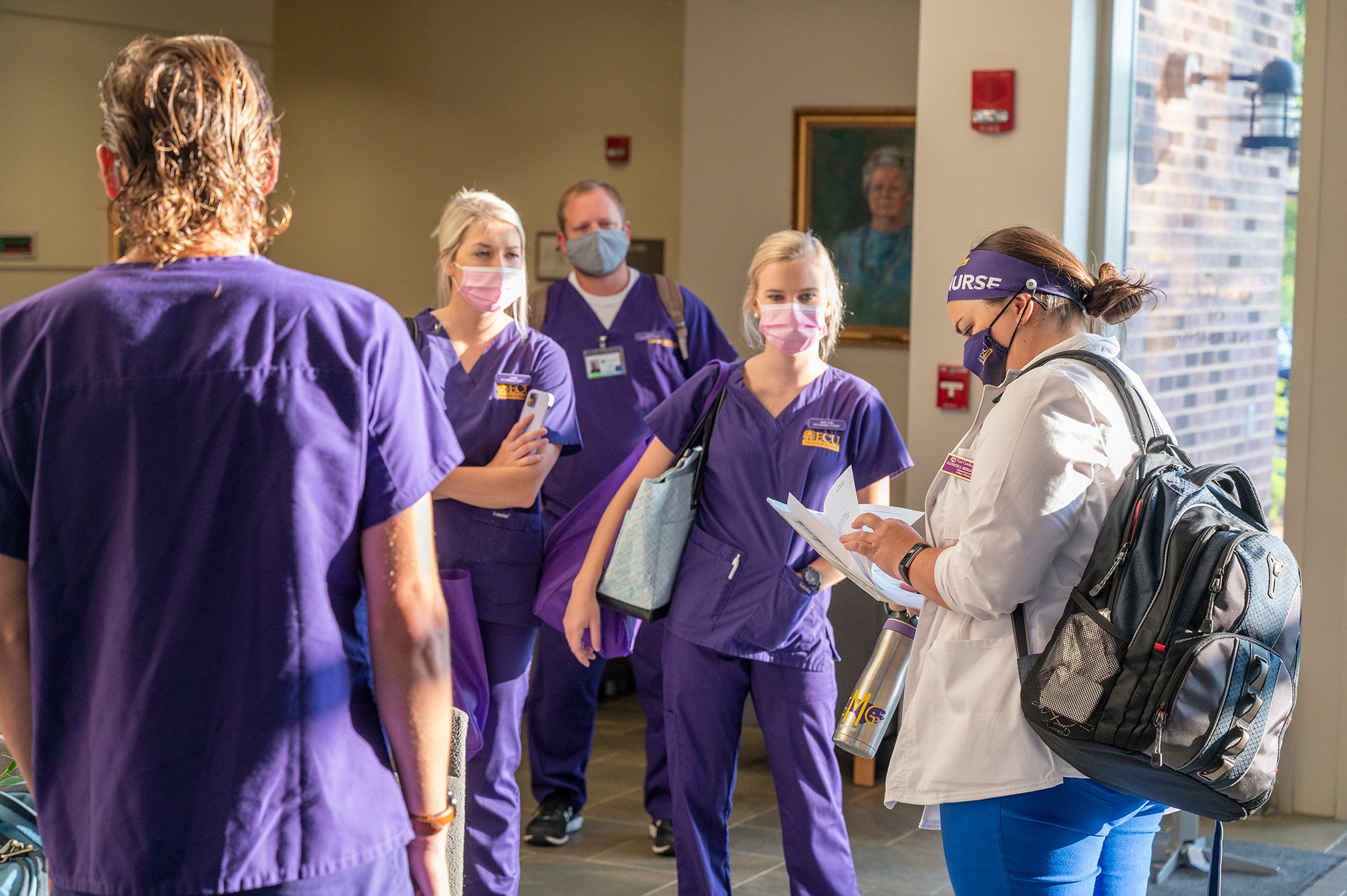
Undergraduate nursing students returned to the College of Nursing for the first day of classes on Monday, Aug. 23. (Photo by Jeremy Smith)
The School of Dental Medicine held its annual Fall Convocation on Aug. 23, a decade to the day after the school first opened its doors to students. The school welcomed 53 students in the Class of 2025 and honored student, faculty and staff achievements and awards over the past year. ECU Chancellor Dr. Philip Rogers delivered a keynote address.
“I want to leave you with a call to action—to continue being part of a school that is living and working the mission of ECU,” Rogers said. “Let your experiences here during the coming year shape you and guide you toward what you were meant to be. Grow and learn—and set out to make life better for those you meet, one smile at a time.”
Dr. Greg Chadwick, dean of the dental school, said the occasion marked a milestone that illuminated the growth shown since admitting the first class of students—including caring for more than 80,000 patients to date and graduating more than 350 alumni, 90% of whom are practicing in North Carolina. He also welcomed the newest class, which represents the school’s ongoing mission.
“To the class of 2025: We welcome you to a school that saw in you, your passion and potential and decided we wanted to play a role in your future,” Chadwick said. “You join a school steeped in history, resilience, discovery, mission, vision and service. Especially service.”
The Brody School of Medicine officially welcomed the Class of 2025 — the most diverse class in the school’s history — during the school’s annual White Coat Ceremony earlier this month. The students were presented with the white coats they will wear in patient care areas throughout their time at ECU.
In his first White Coat Ceremony in his joint role as dean of the Brody School of Medicine and CEO of Vidant Health, Dr. Michael Waldrum congratulated the students for joining a medical school actively improving health in eastern North Carolina, one that embraces diversity to increase opportunity and decrease disparities and is training physicians who stay in North Carolina and serve in North Carolina, particularly in primary care and rural and underserved communities.
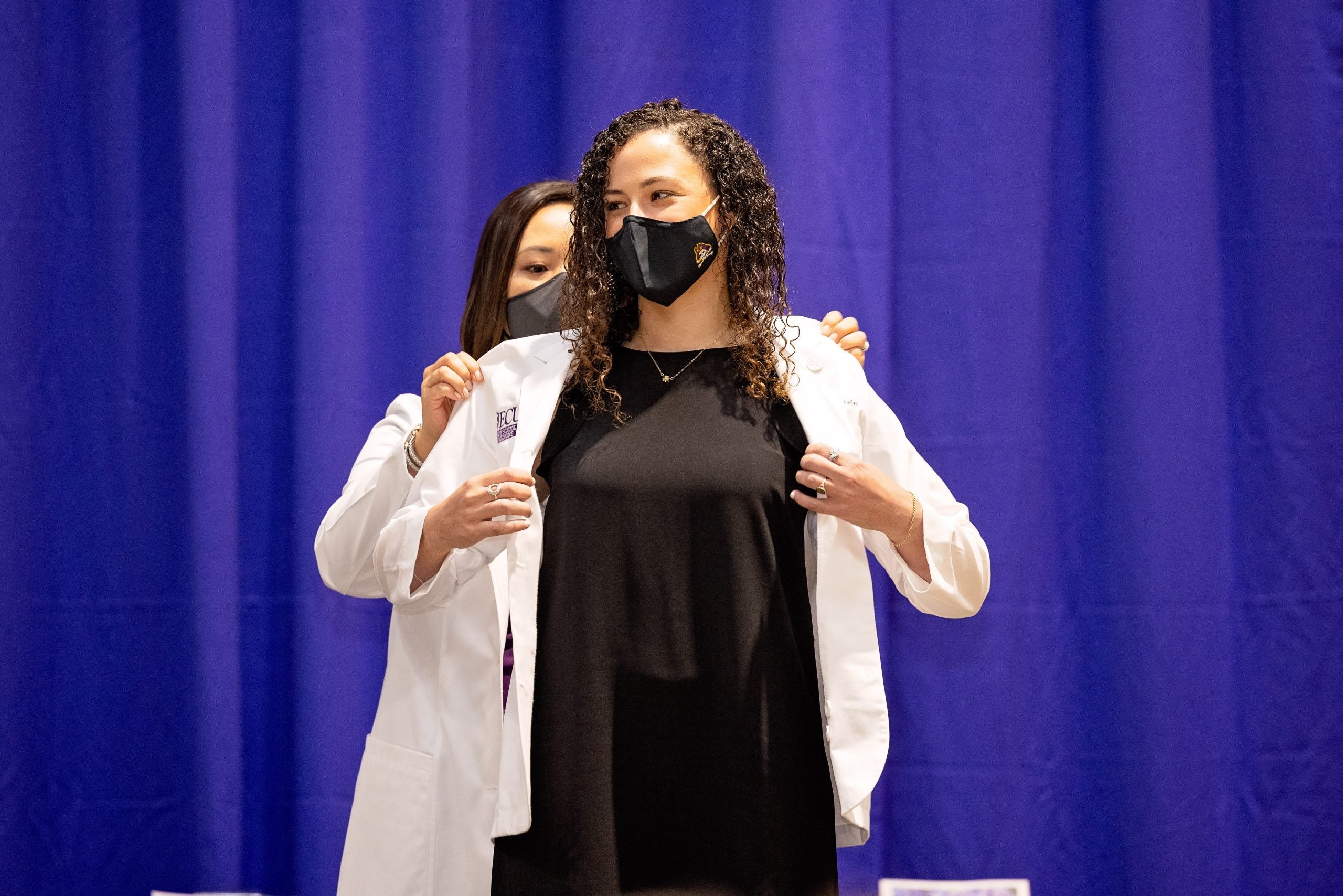
First year medical student and Brody Scholar, Dana Shefet, during the Brody School of Medicine’s White Coat ceremony held July 29. (ECU Photo by Cliff Hollis)
“It’s for North Carolina, by North Carolina. That’s the secret sauce,” Waldrum said. “We know that you’re committed to that mission and to carry the Brody tradition forward. It starts today with receiving your Brody School of Medicine white coat and extends into the future of your lifetime. That future is full of incredibly hard work, and it should be, because nothing of meaning comes easy. But also know that you can do it; we chose you because we know you can do it.”
Brody also celebrated the Class of 2024 with their White Coat Ceremony, which had been postponed last year due to the pandemic.
“I know you’ve had your white coats for a while,” said Chancellor Dr. Philip Rogers at the event. “I did the math, I was told you got them in December, so that’s nine months, and you’re veterans at this medical school thing at this point. You’ve already had the opportunity to experience what medical school is all about. You’ve had an opportunity to witness the importance of the profession that you’ve chosen. You’ve had, already, the opportunity to build and nurture the bonds of trust and friendship of many of the colleagues that you have sitting around you today.
“These are going to be the folks that you rely on in your time of need, they’re going to be the folks that you call in a time of joy to celebrate life’s encouragement along the way. So, I really want to encourage you to bind together.”
Patient Care
The clinical integration between the Brody School of Medicine and Vidant Health comes hand in hand with partnerships that yield even better outcomes for patients.
A new clinical trial partnership between the Brody School of Medicine and Vidant Health, which officially began on Jan. 1, has been awarded membership to the Alliance for Clinical Trials in Oncology ahead of schedule. The honor is based on the partnership’s success in providing access to clinical trials for rare cancers.
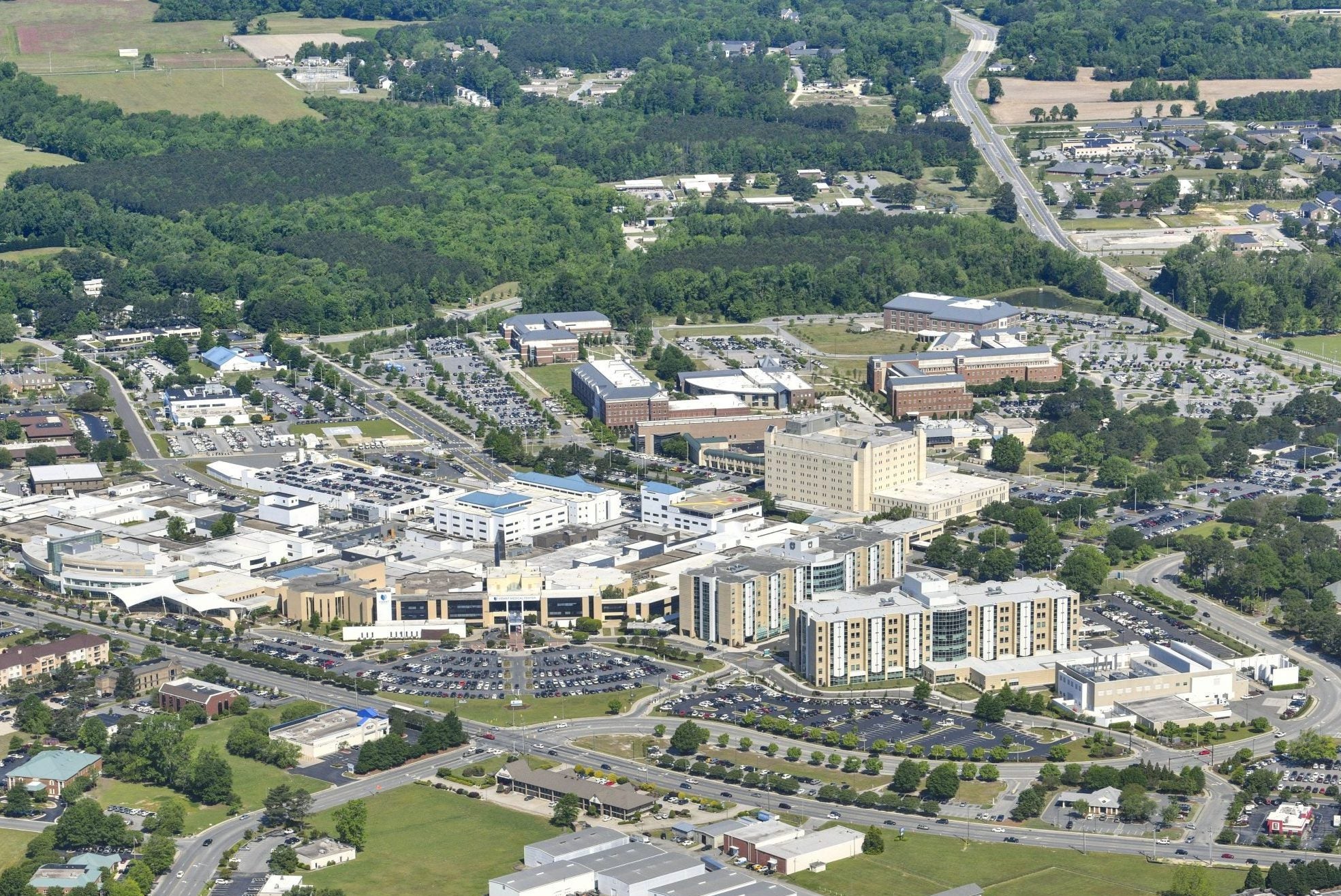
A new clinical trial partnership between East Carolina University’s Brody School of Medicine and Vidant Health has been awarded membership to the Alliance for Clinical Trials in Oncology. (Photo courtesy of Vidant Health)
The Alliance, which is part of the National Clinical Trials Network, is composed of 10,000 cancer specialists across the United States and Canada who develop and conduct high-quality, multidisciplinary cancer control, prevention and treatment trials.
Health care providers typically must demonstrate their ability to meet an annual average enrollment of at least 15 patients in specific clinical trials for rare cancers over a three-year period in order to become Alliance members. However, the ECU and Vidant organizations combined for 17 patient accruals last year and already have 17 this year, which prompted the Alliance to grant ECU and Vidant membership earlier than expected.
“This is a good thing, because it means that throughout the network here at ECU and Vidant, we are offering more and more trials to our patients, especially patients with more unusual diseases,” said Dr. Darla Liles, chief of the Division of Hematology/Oncology at ECU’s Brody School of Medicine. “Hopefully this encourages more people to consider a clinical trial, because I think there is some hesitancy. I think the more people learn that we have these trials — and they don’t have to go to UNC and Duke for these trials, they can get it done right here — the more they will realize that these are really good things that offer cutting-edge treatments for cancer patients.”
Because ECU and Vidant are now members of the Alliance, cancer patients throughout the East will now have access to a larger pool of state-of-the-art clinical trials at ECU and Vidant clinics, including trials for breast, gastrointestinal and genitourinary cancers, as well as leukemia, lymphoma, myeloma, neuro-oncology and respiratory cancers.
“Whether in Greenville or at any of Vidant’s Commission on Cancer-accredited community hospitals, the Alliance partnership between ECU and Vidant represents the shared vision of providing state-of-the-art cancer care in our region, regardless of where or by whom that care is delivered,” said Dr. Emmanuel Zervos, surgical oncologist and director of Vidant Cancer Care. “Cancer services has been at the forefront of collaboration because of the profound impact that cancer has on our region — validation of this collaboration through accelerated full and unrestricted membership into the Alliance assures that these patients will continue to be served both now and into the future.”
Visit ECU’s Office of Clinical Trials website or Vidant Health’s Cancer Clinical Trials website for more information on available clinical trials.
Research
The division’s research achievements were highlighted through publication, grant funding and student research events.
Brody researchers are exploring how differences in mitochondria — the powerhouse of cells — in cancer cells versus normal cells could yield therapies used to treat acute myeloid leukemia (AML).
The research is led by Dr. Kelsey Fisher-Wellman and was recently published as “Intrinstic OXPHOS limitations underlie cellular bioenergetics in leukemia” in the journal eLife, a life sciences journal that publishes high-impact research across scientific disciplines. Fisher-Wellman is an assistant professor in Brody’s Department of Physiology and a researcher in the East Carolina Diabetes and Obesity Institute (ECDOI).
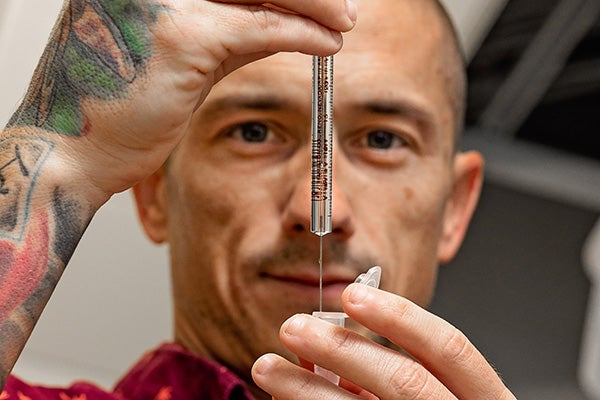
Dr. Kelsey Fisher-Wellman is an assistant professor in Brody’s Department of Physiology and a researcher in the East Carolina Diabetes and Obesity Institute (ECDOI). (ECU Photo by Cliff Hollis.)
AML is a particularly aggressive type of leukemia that interferes with the production of normal white blood cells, red blood cells and platelets. Treatments typically include chemotherapy, other drug therapy and stem-cell transplants.
The research builds on basic phenotyping — identifying a set of observable characteristics in a cell — and uses more sophisticated methods and tools to take that phenotyping to new ground.
“Essentially, we discovered that the mitochondrial biology of the AML cell is unique,” Fisher-Wellman said. “What we do is try and figure out what it is specifically about the metabolism of the cancer cell that’s critical to it being a cancer cell, then we go one level deeper and intrinsically evaluate the energy producing portion of the cell, which would be the mitochondria.”
The mitochondrial research was funded initially by a Department of Defense grant and then one from the Brody Brothers Foundation, which was founded in 1999 when the Brody family of eastern North Carolina donated $7 million to fund research projects at the medical school.
The research led to the discovery that mitochondria behave differently in leukemia cells, consuming ATP instead of creating it. When that supply of ATP was cut off, the leukemia cells died off. Understanding that behavior is essential in targeting those cells in cancer treatment.
“This type of insight is precisely what is needed to give us a chance at a truly cancer-specific mitochondrial targeted therapy,” Fisher-Wellman said.
A compound developed by a Brody associate professor at could lead to more effective skin cancer treatments.
Dr. Rukiyah Van Dross-Anderson, a faculty member in the Brody School of Medicine’s Department of Pharmacology and Toxicology, was awarded a North Carolina Biotechnology Center (NCBC) Translational Research Grant for the development and commercialization of 15-deoxy, Δ12,14-prostaglandin J2-ethanolamide — also known as 15dPMJ2.
The compound is designed to treat melanoma patients. More than 100,000 new cases of melanoma were diagnosed in 2020, leading to 7,000 deaths, with five-year survival rates for stage 4 melanoma patients as low as 22.5%, according to Van Dross-Anderson.
“Our lab’s compound causes cancer cells to release molecules that alert the body that a hazardous condition exists,” Van Dross-Anderson said. “This danger signal is recognized by immune cells that can activate other cells that specialize in killing cancer cells. These cancer-killing cells also remember the cancer if it reappears. As a result, the patient may remain cancer free for longer periods of time.”
Van Dross-Anderson’s study will determine three things: finding the best dose of the compound, figuring out whether the compound is more effective in increasing melanoma survival rates compared to current treatment standards, and showing whether the compound can work cooperatively with additional therapies.
The $110,000 NCBiotech grant allows Van Dross-Anderson to explore the commercial feasibility of the compound. She will develop a business and commercialization case that includes a manufacturing development plan and a management strategy for the compound. Van Dross-Anderson will decide the commercial future of the product and determine whether to advance the technology and seek additional investment funding once it’s produced.
ECU medical and dental students in the Summer Scholars Research and Distinction Track programs showcased their scholarly work on Aug. 2 during the 24th Annual Medical Student Scholarship Forum at the East Carolina Heart Institute at ECU.
The forum gave students an opportunity to present their work and posters to colleagues and guests and was hosted by the ECU Brody School of Medicine’s Office of Medical Education.
“It started with four students in 1997, and we will have over 70 this year,” said Dr. Kori Brewer, associate chief of the Division of Research in Brody’s Department of Emergency Medicine. “This reflects a growing willingness to take advantage of the opportunity to learn things outside of the formal curriculum, something that helps set our students apart from those at other institutions.”
The Brody School of Medicine offers four distinction track programs related to the core missions of the school: Health System Transformation and Leadership, Research, Medical Education and Teaching, as well as Service-Learning.
The ECU School of Dental Medicine offers select incoming students interested in research the opportunity to conduct research alongside faculty mentors.
I.J. Okons, a member of the School of Dental Medicine’s Class of 2025, conducted research on a project titled, “Fractographic Analysis of Different Commercially Available Zirconia Blocks for CAD/CAM Technology.” Dr. Maged Abdelaal, Dr. Mahmoud Serag and Dr. Moeman Sheba, clinical assistant professors of prosthodontics in the dental school’s Department of General Dentistry, served as faculty mentors.
“It was such a great and unique experience to present my research before even starting dental school,” Okons said. “The experience has definitely made me want to continue research as part of my dental education. The thought of doing research on the graduate level is not an intimidating idea to me anymore, and the research I was a part of was very engaging.”
Dr. Swati Surkar, assistant professor in the College of Allied Health Sciences’ Department of Physical Therapy, will receive a $30,000 award from the Academy of Pediatric Physical Therapy to investigate a rehabilitation strategy known as remote ischemic conditioning, which can help children with unilateral cerebral palsy.
In 2019, Surkar was awarded an American Academy for Cerebral Palsy and Developmental medicine Junior Investigator Research Grant.
Dr. Courtney Caiola, assistant professor in the College of Nursing’s Department of Nursing Science, was recently awarded a NIH R21 grant for more than $440,000 over two years through the Department of Health and Human Services for her project “Modeling perceptions of social location and decision-making to develop targeted messaging promoting HIV care engagement and ART adherence among women living with HIV in the South.”
DHS Spotlight
In the spirit of excellence in education and a collaborative campus, we will highlight a variety of students, staff and faculty who represent the colleges and schools in the Division of Health Sciences.
Meet Christian Penister, a student in the School of Dental Medicine.
Christian Penister’s admiration for his childhood dentist and desire to provide care for the underserved led him to dentistry.
Penister, a third-year student in East Carolina University’s School of Dental Medicine, saw a lack of care and access in his hometown of Kenansville.
“The disparities that I and others have faced propelled me further into pursuing dentistry,” Penister said. “I also have four siblings that have truly inspired me to pursue the realm of pediatric dentistry.”
Penister already has had a chance to work with children in Bertie County, an underserved area about 50 miles northeast of Greenville, through the Bertie County School Based Oral Prevention Program.
The program funded by the Duke Endowment makes it possible for ECU dental school students and faculty members to provide comprehensive dental exams, X-rays, cleanings, fluoride varnish application and dental sealants to all public elementary and middle school children in Bertie County.
When the program started in 2019, Bertie County had only one or two licensed dentists for a population of about 21,000 people. According to a 2015-2016 state report, 19% of kindergartners screened in Bertie County had untreated tooth decay.
In fact, Penister, who earned undergraduate degrees in biology and chemistry from ECU in 2019, chose ECU because of its dental school — established to address the shortage of dentists in rural regions across North Carolina.
“Dentistry became an interest of mine at a relatively young age,” Penister said. “I admired my childhood dentist and his chairside manner. I witnessed a lack of care and access in my hometown which has a socioeconomic disadvantage.”
With some time lost because of the pandemic, Penister said learning at a faster pace when classes and clinics resumed was challenging. But he feels blessed to have progressed successfully.
Last year, Penister served as treasurer of ECU Dental Student Government and historian for the Student National Dental Association.
Philanthropy
The legacy of passion and service that nursing alumni have passed to current students is celebrated through the College of Nursing’s Legacy Launch.
Begun in 2020 as part of the College of Nursing’s 60th anniversary, the initiative through the ECU Medical and Health Sciences Foundation Inc. aims to raise funds for scholarships and, at every graduation beginning in December 2020, effectively “launch” new College of Nursing graduates into the profession with customized Pirate Nurse personal protective equipment.
Student scholarships remain a priority for the College of Nursing; 40% of nursing students come from the most impoverished counties in the state. Additionally, 50% of nursing students qualify for FAFSA. There are more than 1,400 nursing students registered for fall 2021.
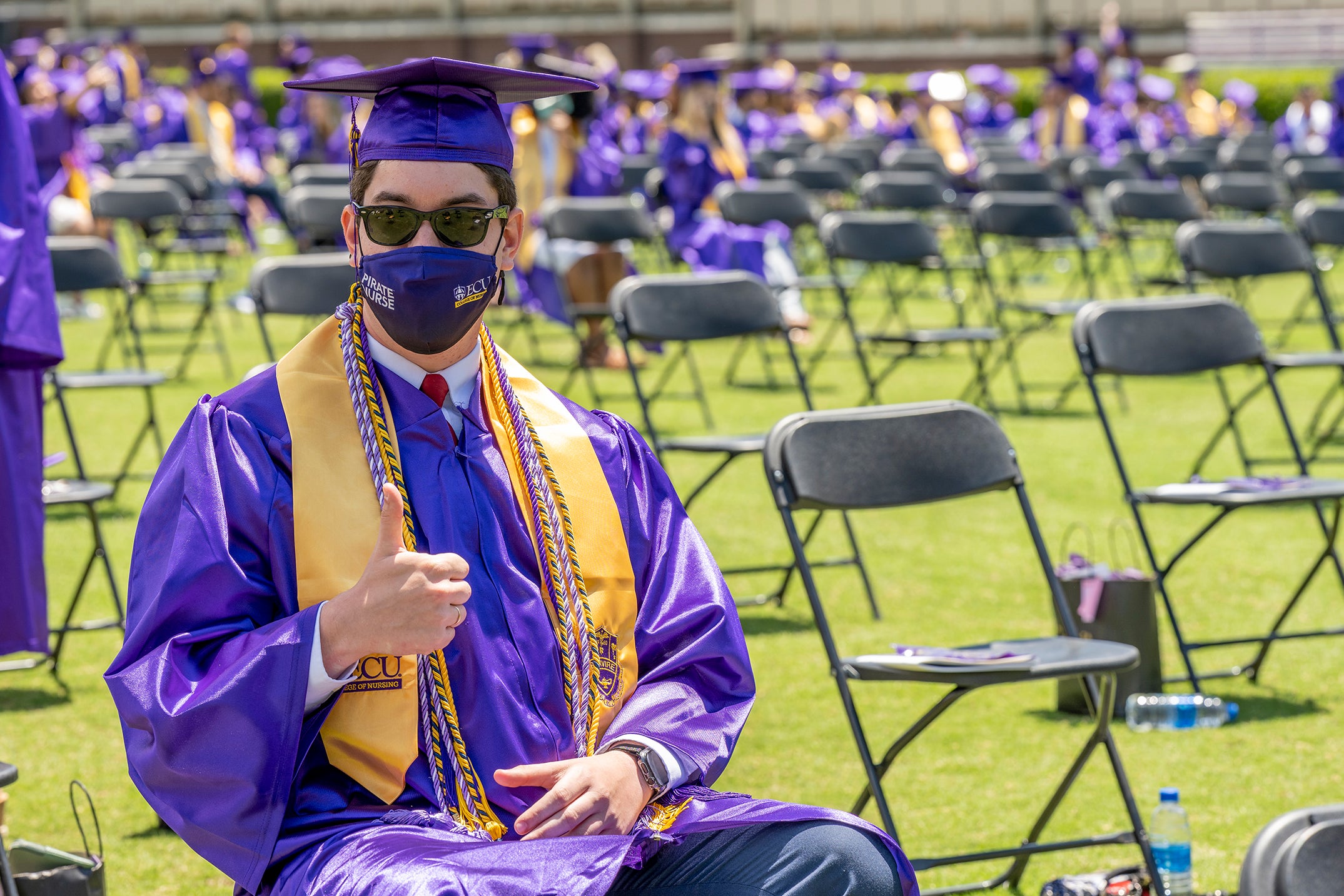
The College of Nursing Legacy Launch effectively “launches” new College of Nursing graduates into the profession with customized Pirate Nurse personal protective equipment. (Contributed photo by Jeremy Smith.)
In 2020, over 82% of new nursing alumni stayed in the state, with over 40% serving eastern North Carolina and nearly 35% working in one of the state’s 40 most distressed counties. To visibly connect new Pirate Nurses to their legacy, each graduate will receive a branded face mask, making them instantly recognizable wherever they serve.
Construction contracting company T.A. Loving Company gave a $10,000 gift to the College of Nursing’s initial Legacy Launch program for nursing scholarships in fall of 2020, securing its success during the college’s 60th anniversary. On behalf of his company, T.A. Loving CEO Sam Hunter has pledged the same gift for the fall of 2021 because he believes that health care must be accessible, high quality and affordable. He knows the ECU College of Nursing delivers on each of those values.
Hunter’s interest in health care comes from a personal, business and civic-minded perspective. Originally from Virginia, just like Taylor Abbit Loving who founded T..A Loving in 1925, Hunter has been successfully contracting health care facilities among others for over 50 years out of the Goldsboro headquarters. Upon arriving in Goldsboro, he quickly learned that ECU was the “economic motor for Eastern North Carolina,” he said.
As CEO of TA Loving, Sam cares about the health care of the company’s more than 300-strong workforce as well. He has served on the Wayne County Hospital Board and worked closely with Wayne Community College. He was pleased to learn about the Regionally Increasing Baccalaureate Nurses (RIBN) program partnership between ECU College of Nursing and Wayne Community College. ECU also partners with 10 other community colleges in eastern North Carolina as part of the RIBN program.
When Hunter initially read about the Legacy Launch scholarship program in The Scope last fall, he wanted more information. Given his interest in health care, he saw how impactful his gift for these scholarships would be and hopes that others will support Legacy Launch as well.
You can support extraordinary future Pirate Nurses with your gift today. Your gift to Legacy Launch supports future Pirate Nurses while honoring our newest members. Whether you are an alumna/alumnus or a friend who values great nurses, you are improving health care delivery in our region and beyond.
